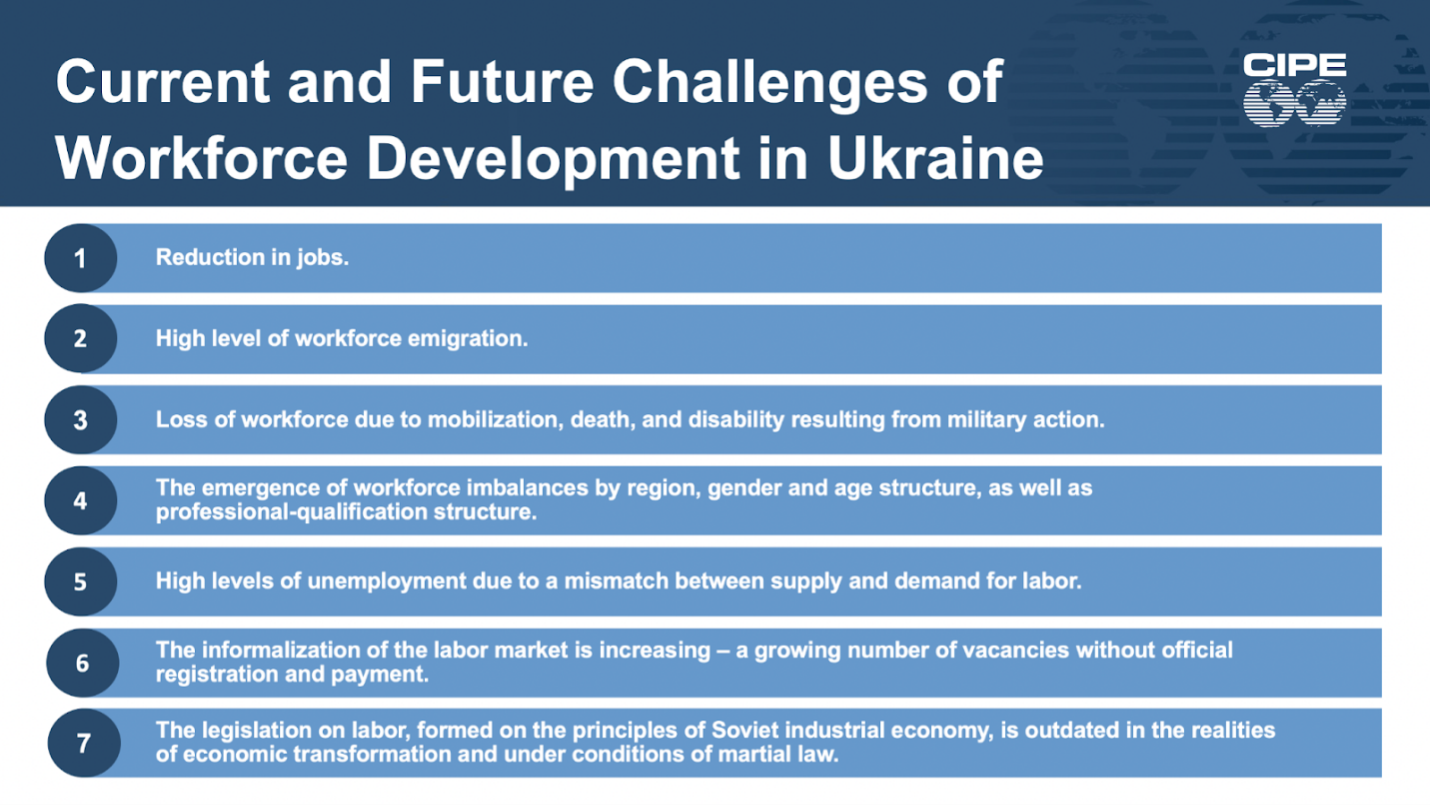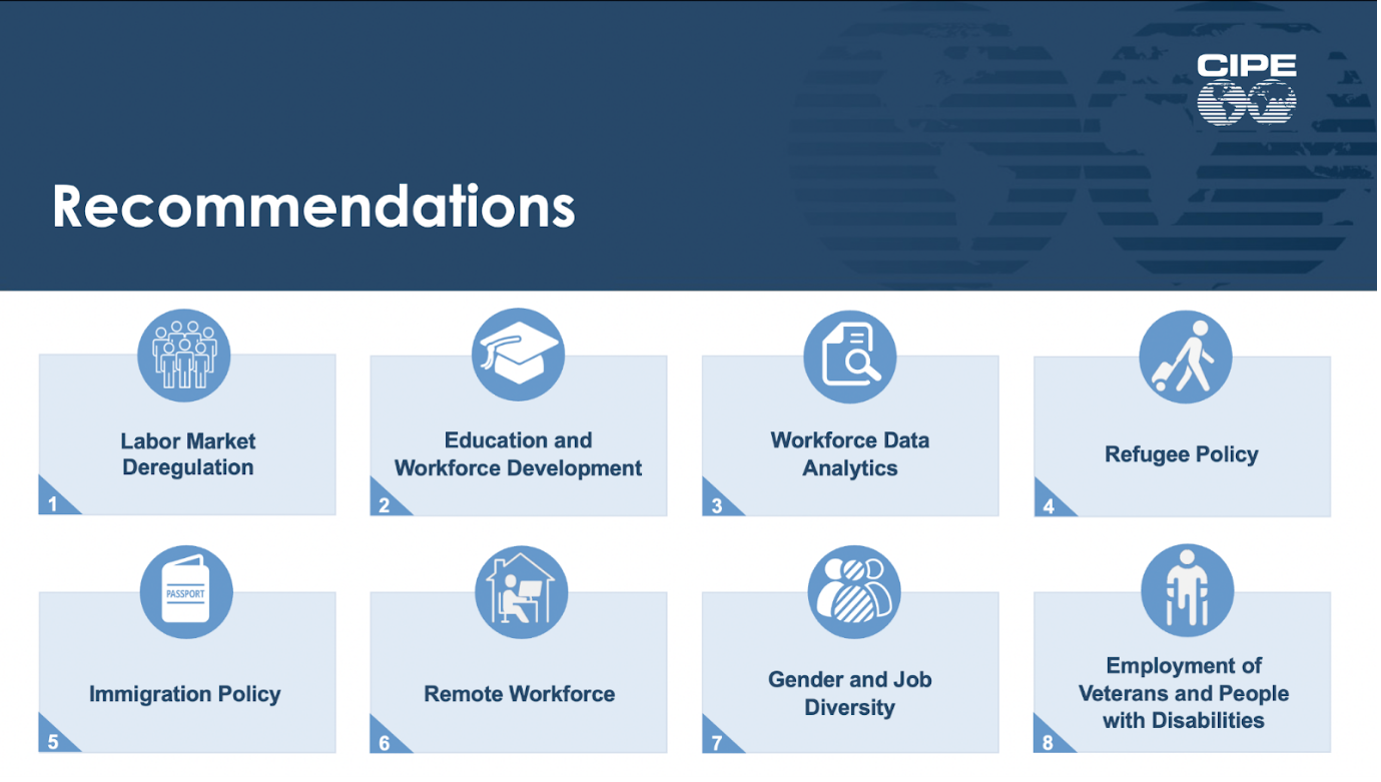
The war in Ukraine has made a profound impact on the country’s economy and labor market: more than 10 percent of the population has left the country, and of those that remain almost 10 percent are unemployed. The government and international organizations are working together to rebuild the economy and create sustainable employment opportunities. The Center for International Private Enterprise (CIPE) has been active in Ukraine for more than 30 years, and recently convened experts to share fresh survey results, insights and policy recommendations in an event it hosted together with the United States Chamber of Commerce Foundation and the Jefferson Institute, called “Leaping Ahead: Ukraine’s Talent and Business Ecosystem”.
Talent development requires collaboration by the private sector, the government, and educators.
Even before the war, Ukraine’s labor market suffered from challenges such as a skills gap, a brain drain, and an aging population. The crisis-caused outflow of talent, internal displacement, and mobilization of men in the armed forces has exacerbated each of these issues. In the day’s opening remarks, CIPE Director for Europe & Eurasia Natalia Otel Belan set the tone: “Talent development requires collaboration by the private sector, the government, and educators,” she told the audience.
Otel Belan then introduced Andriy Karakuts, Chief of the Center of Applied Research. The Ukrainian market and social research firm recently surveyed Ukrainian businesses on the topic, and published a report sponsored by CIPE called Future of Ukraine Workforce. Karakuts shared its main findings:
Guests at the event then heard a public-sector viewpoint from Dariia Andriunina, head of the Labor Migration Unit of the Ministry of Economy of Ukraine Labor and Employment Department. She outlined the government’s efforts to stimulate the labor market and recover human capital. These efforts include grants for businesses and startups, short-term educational opportunities, and integrating people with disabilities into the labor market by adapting working conditions to their needs. The government is also considering liberalizing Ukraine’s labor legislation.
The next two guests shared private-sector perspectives, starting with Andrii Dykun, chairman of the Ukrainian Agrarian Council. Agriculture is a crucial economic sector and Dykun underscored the need to ensure safety for those considering returning to Ukraine, and access to quality business-driven education. He underscored the need for business leaders to engage with the public sector to improve governance and decision-making.
By addressing the skills gap, promoting digital transformation, and implementing supportive policies, Ukraine can pave the way for a brighter future and regain its economic stability.
Andrii Mykytiv, co-owner of K.tex LLC, a leading textiles producer, was the next speaker. A company factory was partially destroyed in the war, and it lost 20% of its workforce. Mykytiv highlighted the importance of self-reliance among businesses in the short term, and urged the government to create a favorable business environment to support economic growth.
To wrap up the event, the panel turned to Jason Tyszko, vice president of the Center for Education and Workforce at the U.S. Chamber of Commerce Foundation. Tyszko stressed the significance of training and digital transformation to address the skills mismatch and fostering economic growth. He mentioned Ukraine’s experience in digital transformation, particularly in the military context, as a source of valuable lessons for other sectors.
Taken together, the thoughts shared and ideas discussed during the event were distilled into eight main recommendations for government to address, in each case with input and partnership from the private sector and Ukraine’s schooling and training sectors:
Ukraine faces significant challenges in rebuilding its workforce in the aftermath of the war. However, the ‘Leaping Ahead – Ukraine’s Talent and Business Ecosystem’ event provided a platform for key stakeholders to come together and discuss potential solutions. Collaboration between the government, private sector, and international community is essential to overcome the labor market challenges and create sustainable employment opportunities for the Ukrainian people. By addressing the skills gap, promoting digital transformation, and implementing supportive policies, Ukraine can pave the way for a brighter future and regain its economic stability.
Published Date: June 16, 2023


